Biomedical Ethics Essay: Evaluating Clinical Equipoise Theory
VerifiedAdded on 2023/05/29
|7
|1904
|470
Essay
AI Summary
This essay delves into the ethical considerations surrounding clinical trials, particularly focusing on the concept of clinical equipoise as proposed by Benjamin Freedman. It examines the debate among medical professionals regarding the ethical requirements for randomized controlled trials (RCTs) and critically analyzes Freedman's theory in light of advancements made by Howard and Brody. The essay discusses the central moral dilemma of RCTs, which involves balancing the objectives of research with the objectives of medical practice, and explores the criticisms of clinical equipoise, including its fragility and practicality. Furthermore, it contrasts Freedman's perspective with Miller and Brody's argument that clinical equipoise is founded on a therapeutic misconception, ultimately concluding that Miller and Brody's theory is more compatible, effective, and practical. Desklib provides solved assignments and resources for students.
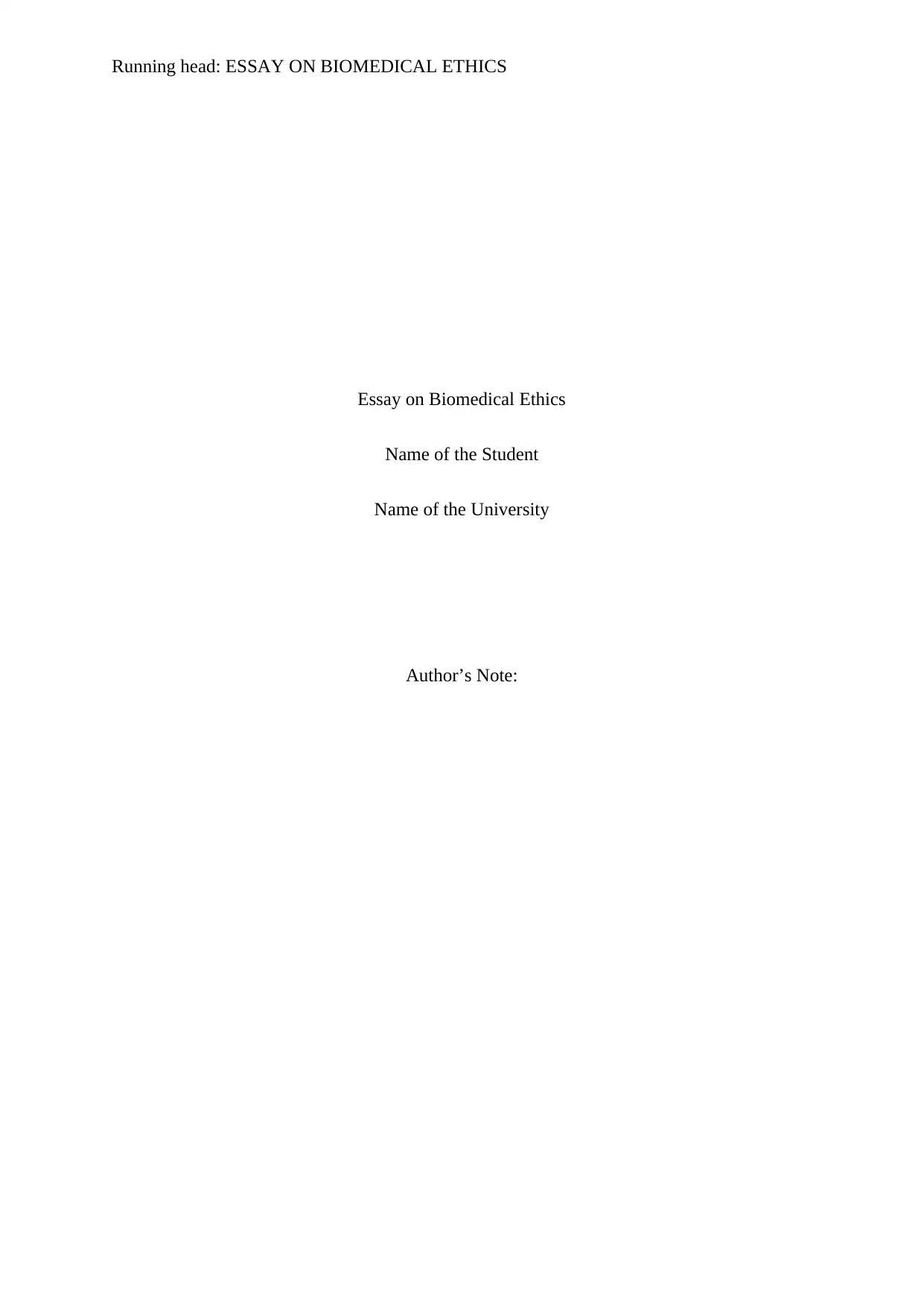
Running head: ESSAY ON BIOMEDICAL ETHICS
Essay on Biomedical Ethics
Name of the Student
Name of the University
Author’s Note:
Essay on Biomedical Ethics
Name of the Student
Name of the University
Author’s Note:
Paraphrase This Document
Need a fresh take? Get an instant paraphrase of this document with our AI Paraphraser
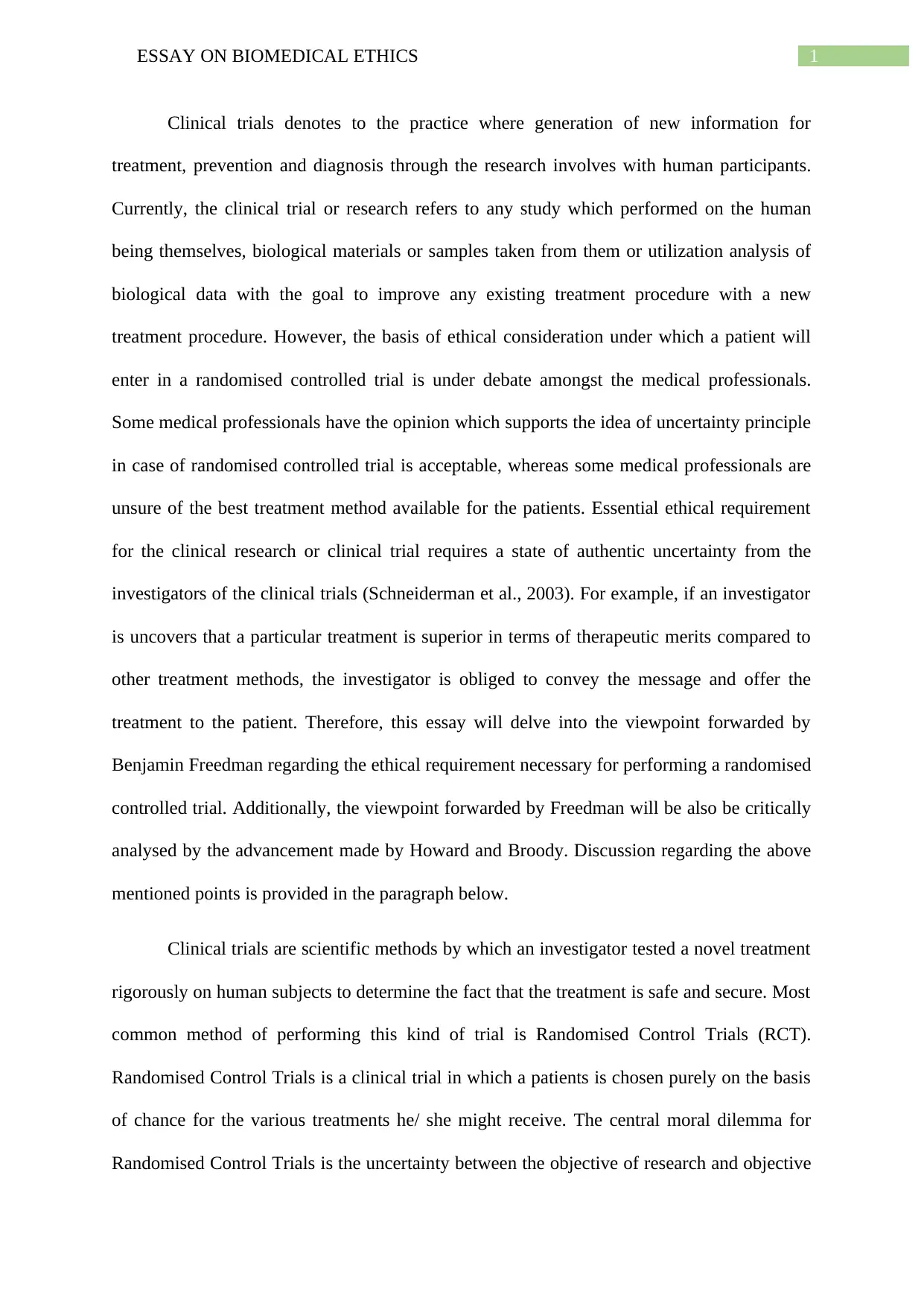
1ESSAY ON BIOMEDICAL ETHICS
Clinical trials denotes to the practice where generation of new information for
treatment, prevention and diagnosis through the research involves with human participants.
Currently, the clinical trial or research refers to any study which performed on the human
being themselves, biological materials or samples taken from them or utilization analysis of
biological data with the goal to improve any existing treatment procedure with a new
treatment procedure. However, the basis of ethical consideration under which a patient will
enter in a randomised controlled trial is under debate amongst the medical professionals.
Some medical professionals have the opinion which supports the idea of uncertainty principle
in case of randomised controlled trial is acceptable, whereas some medical professionals are
unsure of the best treatment method available for the patients. Essential ethical requirement
for the clinical research or clinical trial requires a state of authentic uncertainty from the
investigators of the clinical trials (Schneiderman et al., 2003). For example, if an investigator
is uncovers that a particular treatment is superior in terms of therapeutic merits compared to
other treatment methods, the investigator is obliged to convey the message and offer the
treatment to the patient. Therefore, this essay will delve into the viewpoint forwarded by
Benjamin Freedman regarding the ethical requirement necessary for performing a randomised
controlled trial. Additionally, the viewpoint forwarded by Freedman will be also be critically
analysed by the advancement made by Howard and Broody. Discussion regarding the above
mentioned points is provided in the paragraph below.
Clinical trials are scientific methods by which an investigator tested a novel treatment
rigorously on human subjects to determine the fact that the treatment is safe and secure. Most
common method of performing this kind of trial is Randomised Control Trials (RCT).
Randomised Control Trials is a clinical trial in which a patients is chosen purely on the basis
of chance for the various treatments he/ she might receive. The central moral dilemma for
Randomised Control Trials is the uncertainty between the objective of research and objective
Clinical trials denotes to the practice where generation of new information for
treatment, prevention and diagnosis through the research involves with human participants.
Currently, the clinical trial or research refers to any study which performed on the human
being themselves, biological materials or samples taken from them or utilization analysis of
biological data with the goal to improve any existing treatment procedure with a new
treatment procedure. However, the basis of ethical consideration under which a patient will
enter in a randomised controlled trial is under debate amongst the medical professionals.
Some medical professionals have the opinion which supports the idea of uncertainty principle
in case of randomised controlled trial is acceptable, whereas some medical professionals are
unsure of the best treatment method available for the patients. Essential ethical requirement
for the clinical research or clinical trial requires a state of authentic uncertainty from the
investigators of the clinical trials (Schneiderman et al., 2003). For example, if an investigator
is uncovers that a particular treatment is superior in terms of therapeutic merits compared to
other treatment methods, the investigator is obliged to convey the message and offer the
treatment to the patient. Therefore, this essay will delve into the viewpoint forwarded by
Benjamin Freedman regarding the ethical requirement necessary for performing a randomised
controlled trial. Additionally, the viewpoint forwarded by Freedman will be also be critically
analysed by the advancement made by Howard and Broody. Discussion regarding the above
mentioned points is provided in the paragraph below.
Clinical trials are scientific methods by which an investigator tested a novel treatment
rigorously on human subjects to determine the fact that the treatment is safe and secure. Most
common method of performing this kind of trial is Randomised Control Trials (RCT).
Randomised Control Trials is a clinical trial in which a patients is chosen purely on the basis
of chance for the various treatments he/ she might receive. The central moral dilemma for
Randomised Control Trials is the uncertainty between the objective of research and objective
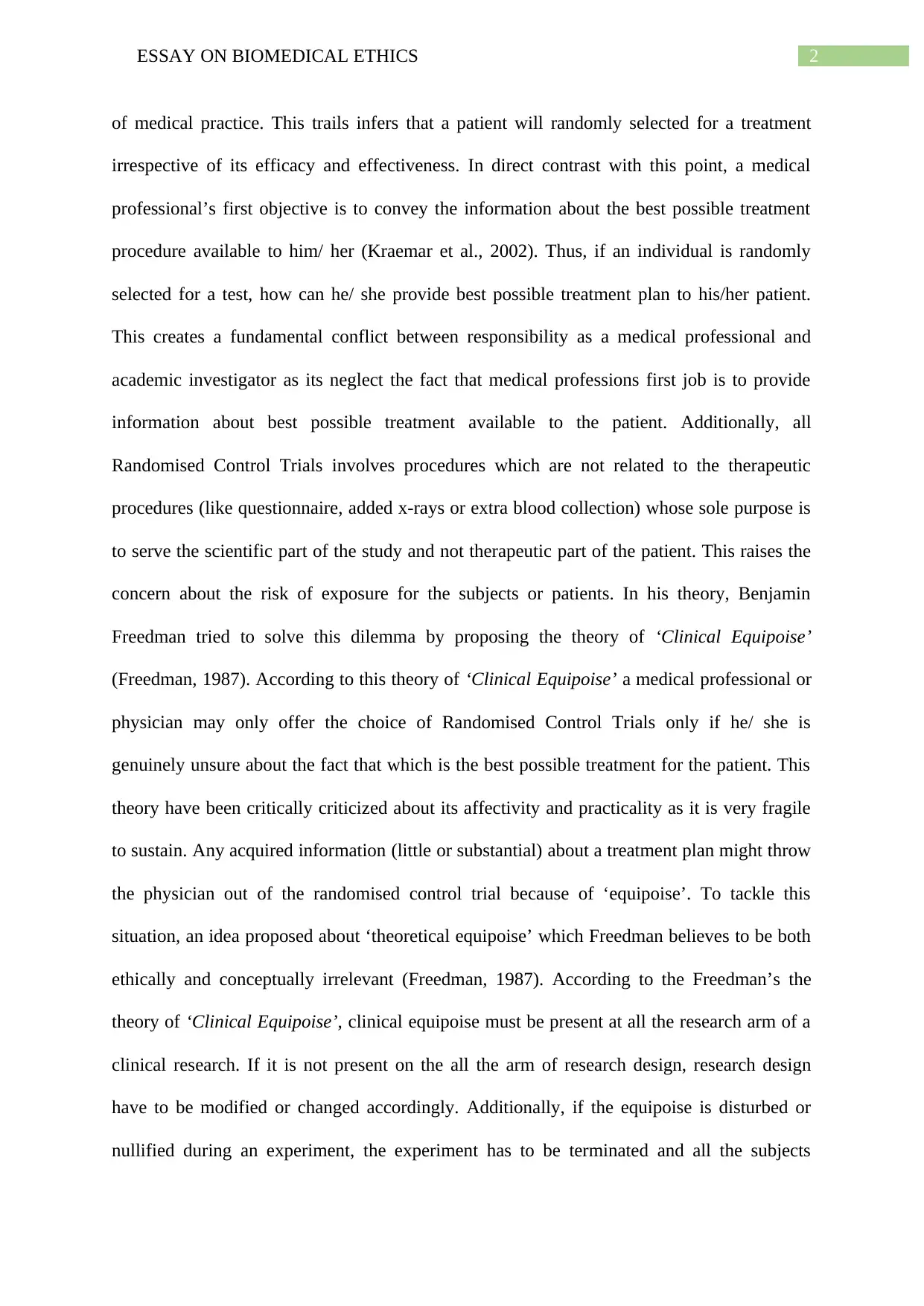
2ESSAY ON BIOMEDICAL ETHICS
of medical practice. This trails infers that a patient will randomly selected for a treatment
irrespective of its efficacy and effectiveness. In direct contrast with this point, a medical
professional’s first objective is to convey the information about the best possible treatment
procedure available to him/ her (Kraemar et al., 2002). Thus, if an individual is randomly
selected for a test, how can he/ she provide best possible treatment plan to his/her patient.
This creates a fundamental conflict between responsibility as a medical professional and
academic investigator as its neglect the fact that medical professions first job is to provide
information about best possible treatment available to the patient. Additionally, all
Randomised Control Trials involves procedures which are not related to the therapeutic
procedures (like questionnaire, added x-rays or extra blood collection) whose sole purpose is
to serve the scientific part of the study and not therapeutic part of the patient. This raises the
concern about the risk of exposure for the subjects or patients. In his theory, Benjamin
Freedman tried to solve this dilemma by proposing the theory of ‘Clinical Equipoise’
(Freedman, 1987). According to this theory of ‘Clinical Equipoise’ a medical professional or
physician may only offer the choice of Randomised Control Trials only if he/ she is
genuinely unsure about the fact that which is the best possible treatment for the patient. This
theory have been critically criticized about its affectivity and practicality as it is very fragile
to sustain. Any acquired information (little or substantial) about a treatment plan might throw
the physician out of the randomised control trial because of ‘equipoise’. To tackle this
situation, an idea proposed about ‘theoretical equipoise’ which Freedman believes to be both
ethically and conceptually irrelevant (Freedman, 1987). According to the Freedman’s the
theory of ‘Clinical Equipoise’, clinical equipoise must be present at all the research arm of a
clinical research. If it is not present on the all the arm of research design, research design
have to be modified or changed accordingly. Additionally, if the equipoise is disturbed or
nullified during an experiment, the experiment has to be terminated and all the subjects
of medical practice. This trails infers that a patient will randomly selected for a treatment
irrespective of its efficacy and effectiveness. In direct contrast with this point, a medical
professional’s first objective is to convey the information about the best possible treatment
procedure available to him/ her (Kraemar et al., 2002). Thus, if an individual is randomly
selected for a test, how can he/ she provide best possible treatment plan to his/her patient.
This creates a fundamental conflict between responsibility as a medical professional and
academic investigator as its neglect the fact that medical professions first job is to provide
information about best possible treatment available to the patient. Additionally, all
Randomised Control Trials involves procedures which are not related to the therapeutic
procedures (like questionnaire, added x-rays or extra blood collection) whose sole purpose is
to serve the scientific part of the study and not therapeutic part of the patient. This raises the
concern about the risk of exposure for the subjects or patients. In his theory, Benjamin
Freedman tried to solve this dilemma by proposing the theory of ‘Clinical Equipoise’
(Freedman, 1987). According to this theory of ‘Clinical Equipoise’ a medical professional or
physician may only offer the choice of Randomised Control Trials only if he/ she is
genuinely unsure about the fact that which is the best possible treatment for the patient. This
theory have been critically criticized about its affectivity and practicality as it is very fragile
to sustain. Any acquired information (little or substantial) about a treatment plan might throw
the physician out of the randomised control trial because of ‘equipoise’. To tackle this
situation, an idea proposed about ‘theoretical equipoise’ which Freedman believes to be both
ethically and conceptually irrelevant (Freedman, 1987). According to the Freedman’s the
theory of ‘Clinical Equipoise’, clinical equipoise must be present at all the research arm of a
clinical research. If it is not present on the all the arm of research design, research design
have to be modified or changed accordingly. Additionally, if the equipoise is disturbed or
nullified during an experiment, the experiment has to be terminated and all the subjects
⊘ This is a preview!⊘
Do you want full access?
Subscribe today to unlock all pages.

Trusted by 1+ million students worldwide
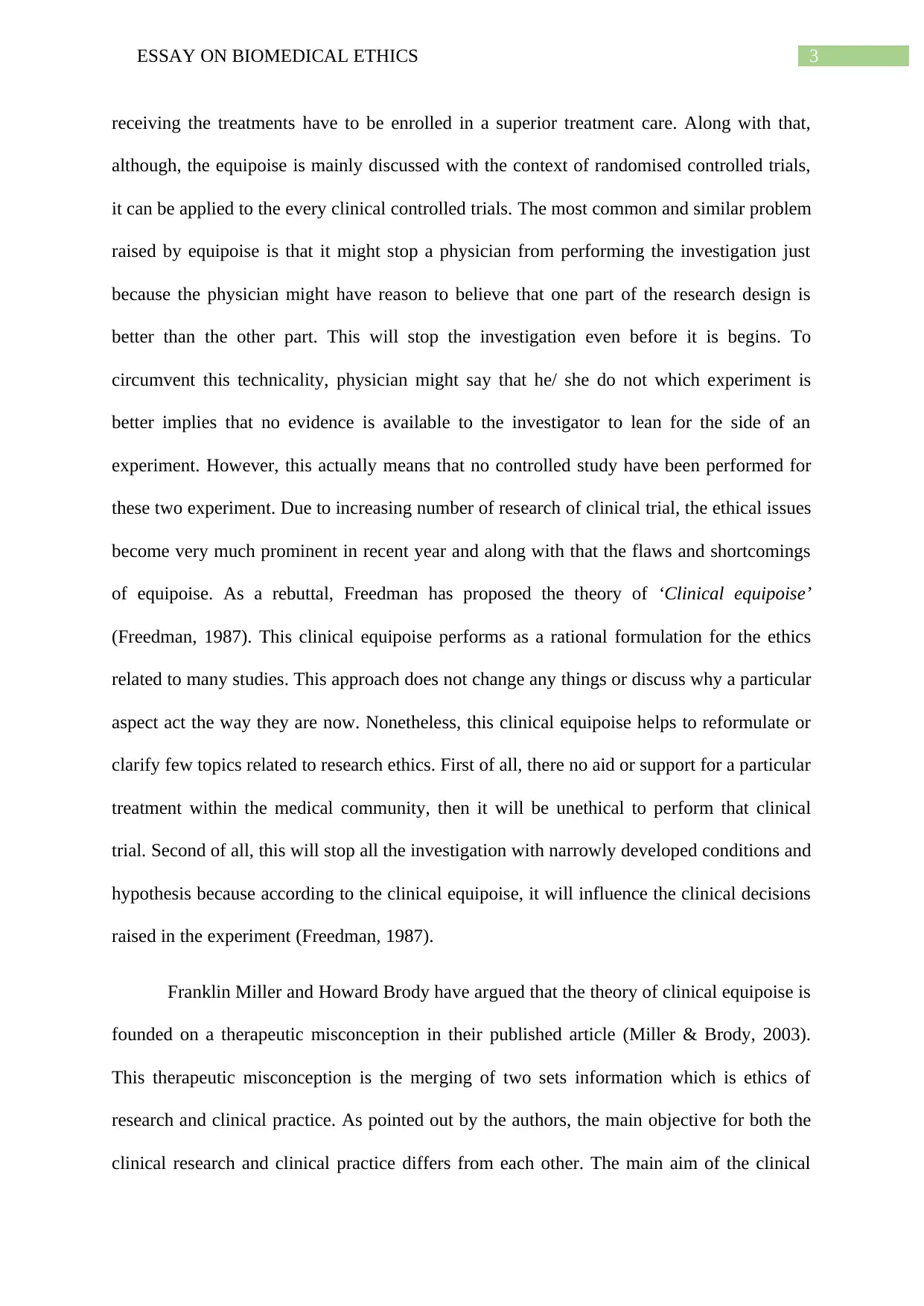
3ESSAY ON BIOMEDICAL ETHICS
receiving the treatments have to be enrolled in a superior treatment care. Along with that,
although, the equipoise is mainly discussed with the context of randomised controlled trials,
it can be applied to the every clinical controlled trials. The most common and similar problem
raised by equipoise is that it might stop a physician from performing the investigation just
because the physician might have reason to believe that one part of the research design is
better than the other part. This will stop the investigation even before it is begins. To
circumvent this technicality, physician might say that he/ she do not which experiment is
better implies that no evidence is available to the investigator to lean for the side of an
experiment. However, this actually means that no controlled study have been performed for
these two experiment. Due to increasing number of research of clinical trial, the ethical issues
become very much prominent in recent year and along with that the flaws and shortcomings
of equipoise. As a rebuttal, Freedman has proposed the theory of ‘Clinical equipoise’
(Freedman, 1987). This clinical equipoise performs as a rational formulation for the ethics
related to many studies. This approach does not change any things or discuss why a particular
aspect act the way they are now. Nonetheless, this clinical equipoise helps to reformulate or
clarify few topics related to research ethics. First of all, there no aid or support for a particular
treatment within the medical community, then it will be unethical to perform that clinical
trial. Second of all, this will stop all the investigation with narrowly developed conditions and
hypothesis because according to the clinical equipoise, it will influence the clinical decisions
raised in the experiment (Freedman, 1987).
Franklin Miller and Howard Brody have argued that the theory of clinical equipoise is
founded on a therapeutic misconception in their published article (Miller & Brody, 2003).
This therapeutic misconception is the merging of two sets information which is ethics of
research and clinical practice. As pointed out by the authors, the main objective for both the
clinical research and clinical practice differs from each other. The main aim of the clinical
receiving the treatments have to be enrolled in a superior treatment care. Along with that,
although, the equipoise is mainly discussed with the context of randomised controlled trials,
it can be applied to the every clinical controlled trials. The most common and similar problem
raised by equipoise is that it might stop a physician from performing the investigation just
because the physician might have reason to believe that one part of the research design is
better than the other part. This will stop the investigation even before it is begins. To
circumvent this technicality, physician might say that he/ she do not which experiment is
better implies that no evidence is available to the investigator to lean for the side of an
experiment. However, this actually means that no controlled study have been performed for
these two experiment. Due to increasing number of research of clinical trial, the ethical issues
become very much prominent in recent year and along with that the flaws and shortcomings
of equipoise. As a rebuttal, Freedman has proposed the theory of ‘Clinical equipoise’
(Freedman, 1987). This clinical equipoise performs as a rational formulation for the ethics
related to many studies. This approach does not change any things or discuss why a particular
aspect act the way they are now. Nonetheless, this clinical equipoise helps to reformulate or
clarify few topics related to research ethics. First of all, there no aid or support for a particular
treatment within the medical community, then it will be unethical to perform that clinical
trial. Second of all, this will stop all the investigation with narrowly developed conditions and
hypothesis because according to the clinical equipoise, it will influence the clinical decisions
raised in the experiment (Freedman, 1987).
Franklin Miller and Howard Brody have argued that the theory of clinical equipoise is
founded on a therapeutic misconception in their published article (Miller & Brody, 2003).
This therapeutic misconception is the merging of two sets information which is ethics of
research and clinical practice. As pointed out by the authors, the main objective for both the
clinical research and clinical practice differs from each other. The main aim of the clinical
Paraphrase This Document
Need a fresh take? Get an instant paraphrase of this document with our AI Paraphraser
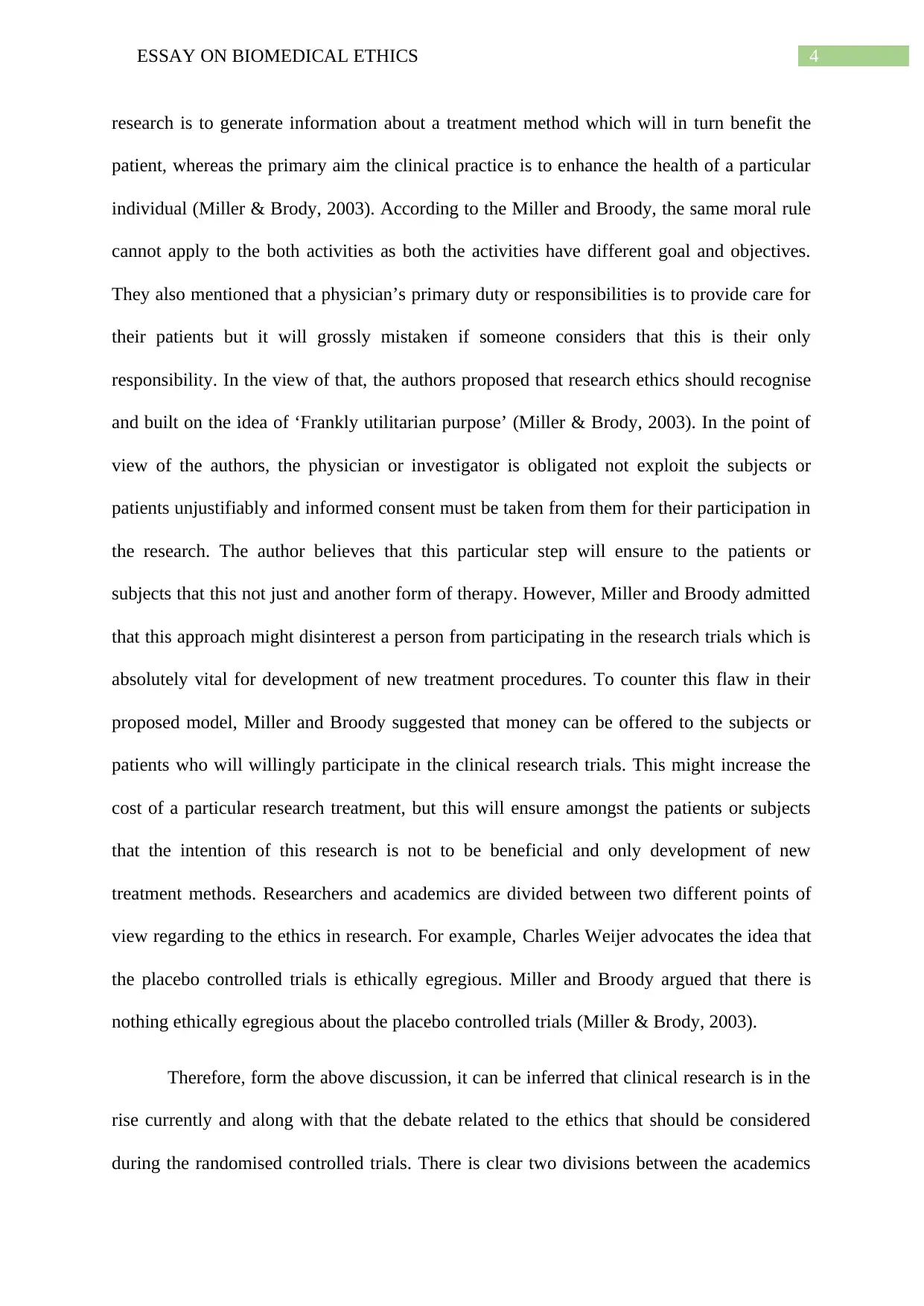
4ESSAY ON BIOMEDICAL ETHICS
research is to generate information about a treatment method which will in turn benefit the
patient, whereas the primary aim the clinical practice is to enhance the health of a particular
individual (Miller & Brody, 2003). According to the Miller and Broody, the same moral rule
cannot apply to the both activities as both the activities have different goal and objectives.
They also mentioned that a physician’s primary duty or responsibilities is to provide care for
their patients but it will grossly mistaken if someone considers that this is their only
responsibility. In the view of that, the authors proposed that research ethics should recognise
and built on the idea of ‘Frankly utilitarian purpose’ (Miller & Brody, 2003). In the point of
view of the authors, the physician or investigator is obligated not exploit the subjects or
patients unjustifiably and informed consent must be taken from them for their participation in
the research. The author believes that this particular step will ensure to the patients or
subjects that this not just and another form of therapy. However, Miller and Broody admitted
that this approach might disinterest a person from participating in the research trials which is
absolutely vital for development of new treatment procedures. To counter this flaw in their
proposed model, Miller and Broody suggested that money can be offered to the subjects or
patients who will willingly participate in the clinical research trials. This might increase the
cost of a particular research treatment, but this will ensure amongst the patients or subjects
that the intention of this research is not to be beneficial and only development of new
treatment methods. Researchers and academics are divided between two different points of
view regarding to the ethics in research. For example, Charles Weijer advocates the idea that
the placebo controlled trials is ethically egregious. Miller and Broody argued that there is
nothing ethically egregious about the placebo controlled trials (Miller & Brody, 2003).
Therefore, form the above discussion, it can be inferred that clinical research is in the
rise currently and along with that the debate related to the ethics that should be considered
during the randomised controlled trials. There is clear two divisions between the academics
research is to generate information about a treatment method which will in turn benefit the
patient, whereas the primary aim the clinical practice is to enhance the health of a particular
individual (Miller & Brody, 2003). According to the Miller and Broody, the same moral rule
cannot apply to the both activities as both the activities have different goal and objectives.
They also mentioned that a physician’s primary duty or responsibilities is to provide care for
their patients but it will grossly mistaken if someone considers that this is their only
responsibility. In the view of that, the authors proposed that research ethics should recognise
and built on the idea of ‘Frankly utilitarian purpose’ (Miller & Brody, 2003). In the point of
view of the authors, the physician or investigator is obligated not exploit the subjects or
patients unjustifiably and informed consent must be taken from them for their participation in
the research. The author believes that this particular step will ensure to the patients or
subjects that this not just and another form of therapy. However, Miller and Broody admitted
that this approach might disinterest a person from participating in the research trials which is
absolutely vital for development of new treatment procedures. To counter this flaw in their
proposed model, Miller and Broody suggested that money can be offered to the subjects or
patients who will willingly participate in the clinical research trials. This might increase the
cost of a particular research treatment, but this will ensure amongst the patients or subjects
that the intention of this research is not to be beneficial and only development of new
treatment methods. Researchers and academics are divided between two different points of
view regarding to the ethics in research. For example, Charles Weijer advocates the idea that
the placebo controlled trials is ethically egregious. Miller and Broody argued that there is
nothing ethically egregious about the placebo controlled trials (Miller & Brody, 2003).
Therefore, form the above discussion, it can be inferred that clinical research is in the
rise currently and along with that the debate related to the ethics that should be considered
during the randomised controlled trials. There is clear two divisions between the academics
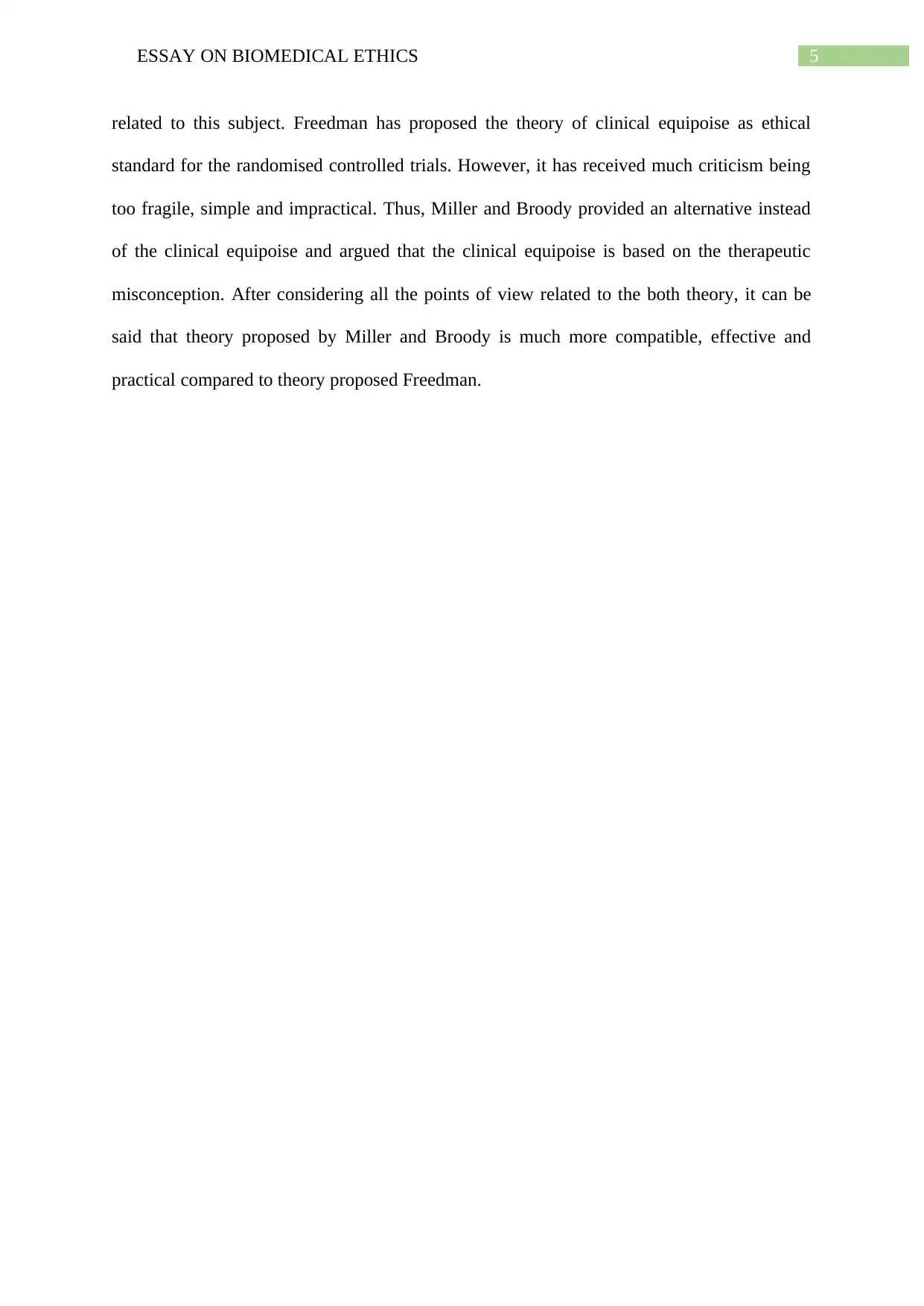
5ESSAY ON BIOMEDICAL ETHICS
related to this subject. Freedman has proposed the theory of clinical equipoise as ethical
standard for the randomised controlled trials. However, it has received much criticism being
too fragile, simple and impractical. Thus, Miller and Broody provided an alternative instead
of the clinical equipoise and argued that the clinical equipoise is based on the therapeutic
misconception. After considering all the points of view related to the both theory, it can be
said that theory proposed by Miller and Broody is much more compatible, effective and
practical compared to theory proposed Freedman.
related to this subject. Freedman has proposed the theory of clinical equipoise as ethical
standard for the randomised controlled trials. However, it has received much criticism being
too fragile, simple and impractical. Thus, Miller and Broody provided an alternative instead
of the clinical equipoise and argued that the clinical equipoise is based on the therapeutic
misconception. After considering all the points of view related to the both theory, it can be
said that theory proposed by Miller and Broody is much more compatible, effective and
practical compared to theory proposed Freedman.
⊘ This is a preview!⊘
Do you want full access?
Subscribe today to unlock all pages.

Trusted by 1+ million students worldwide
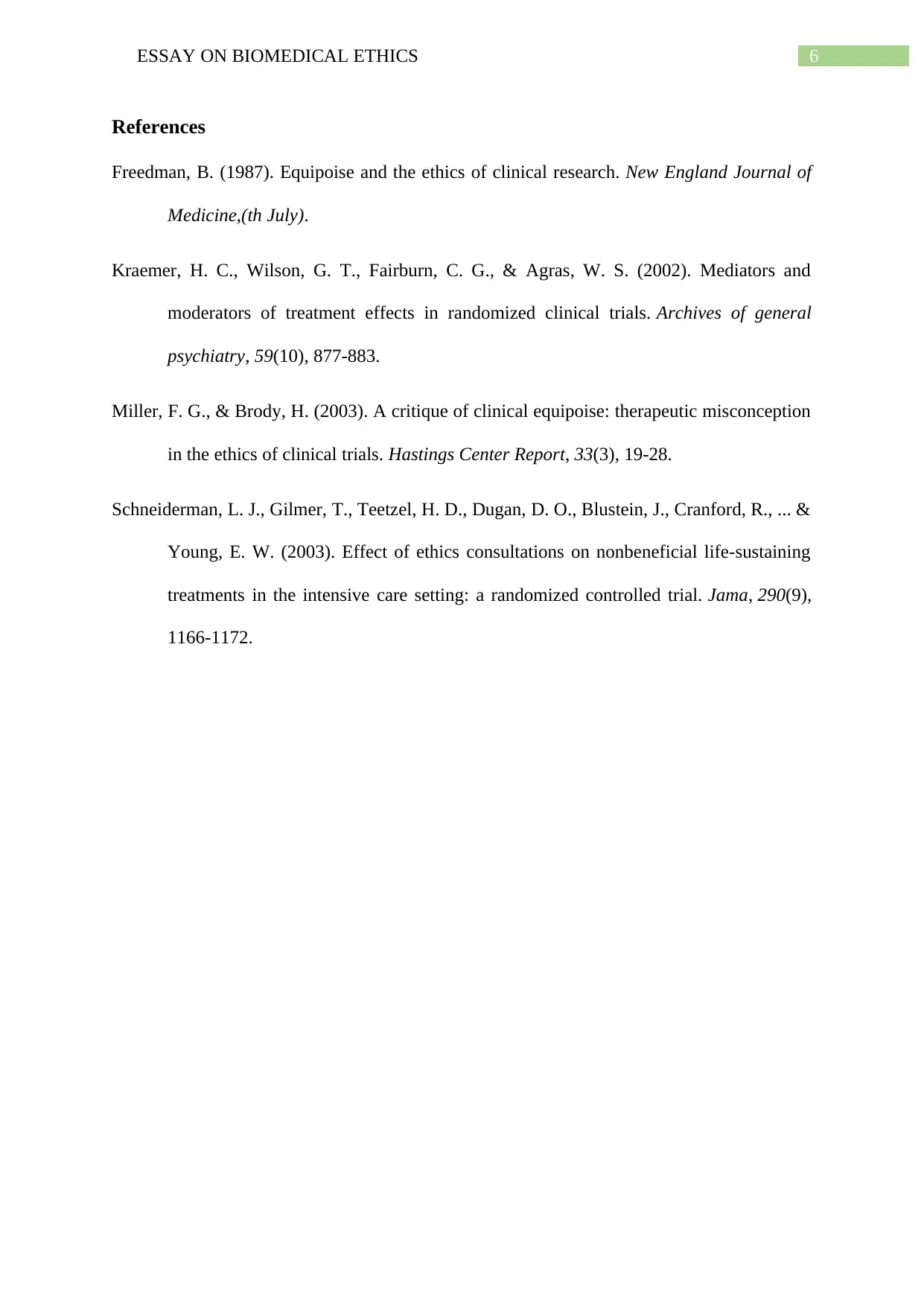
6ESSAY ON BIOMEDICAL ETHICS
References
Freedman, B. (1987). Equipoise and the ethics of clinical research. New England Journal of
Medicine,(th July).
Kraemer, H. C., Wilson, G. T., Fairburn, C. G., & Agras, W. S. (2002). Mediators and
moderators of treatment effects in randomized clinical trials. Archives of general
psychiatry, 59(10), 877-883.
Miller, F. G., & Brody, H. (2003). A critique of clinical equipoise: therapeutic misconception
in the ethics of clinical trials. Hastings Center Report, 33(3), 19-28.
Schneiderman, L. J., Gilmer, T., Teetzel, H. D., Dugan, D. O., Blustein, J., Cranford, R., ... &
Young, E. W. (2003). Effect of ethics consultations on nonbeneficial life-sustaining
treatments in the intensive care setting: a randomized controlled trial. Jama, 290(9),
1166-1172.
References
Freedman, B. (1987). Equipoise and the ethics of clinical research. New England Journal of
Medicine,(th July).
Kraemer, H. C., Wilson, G. T., Fairburn, C. G., & Agras, W. S. (2002). Mediators and
moderators of treatment effects in randomized clinical trials. Archives of general
psychiatry, 59(10), 877-883.
Miller, F. G., & Brody, H. (2003). A critique of clinical equipoise: therapeutic misconception
in the ethics of clinical trials. Hastings Center Report, 33(3), 19-28.
Schneiderman, L. J., Gilmer, T., Teetzel, H. D., Dugan, D. O., Blustein, J., Cranford, R., ... &
Young, E. W. (2003). Effect of ethics consultations on nonbeneficial life-sustaining
treatments in the intensive care setting: a randomized controlled trial. Jama, 290(9),
1166-1172.
1 out of 7
Related Documents
Your All-in-One AI-Powered Toolkit for Academic Success.
+13062052269
info@desklib.com
Available 24*7 on WhatsApp / Email
![[object Object]](/_next/static/media/star-bottom.7253800d.svg)
Unlock your academic potential
Copyright © 2020–2026 A2Z Services. All Rights Reserved. Developed and managed by ZUCOL.





